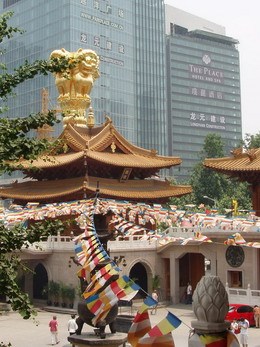
Unlike its name Jing'an, which means serenity, Jing'an Temple today is situated in a bustling area adjacent to an enormous beehive shopping mall. The temple remains relatively tranquil, however, and you can attend to both your spiritual and material needs in one easy trip.The red and ochre temple, one of Shanghai's oldest, is a landmark in downtown Jing'an District, seated squarely on the Nanjing Road shopping artery. Jing'an Temple has a history of more than 1,760 years, and much was destroyed over the years and rebuilt. It was built in AD 247 during the Three Kingdoms period (AD 220–280) near what is now Suzhou Creek.
It was named "Huduchongxuan," and then renamed "Yongtai" (meaning perpetual peace) in the Tang Dynasty (AD 618–907). It was relocated from the creek area because of erosion and named Jing'an in 1216 during the Song Dynasty (960-1279).
In the temple is the Grand Hall of the Great Sage, a plaza, Sakyamuni Palace, Avalokitesvara (Guanyin) Palace, Gold Buddha Palace and a vegetarian restaurant which is closed for renovation. At the core is the Grand Hall with three statues of Sakyamuni, a key figure in Buddhism.
Ten years of reconstruction and restoration of the Grand Hall were completed in 2008. Over the years it had been used as a plastics factory. It is 26 meters high, with 46 intricately carved teak pillars. A 15-ton pure silver statue of Sakyamuni is enshrined.
Adjacent to the Grand Hall is Avalokitesvara Palace, sacred to the goddess of mercy, Guanyin, who is widely worshipped in China. Her camphor wood statue is 6.2 meters high and weighs 5 tons. She is seated on a lotus-shaped base.
In the middle of the temple plaza is a three-story pagoda. It is a tradition to throw coins as high as possible into the tower to bring good luck.
The temple houses many antiquities, including a 3.5-ton copper bell named Hongwu cast in the Ming Dynasty (1368-1644). The temple stores many sutras. Souvenir shops are open, of course, selling Buddhist items, incense, jewelry and trinkets. Just a few steps away is Jing'an Park, a respite from the hectic shopping area.
It's tranquil and there's a Southeast Asian restaurant where you can eat outside overlooking a pond on warm days.

Copyright ©1999-2011 Chinanews.com. All rights reserved.
Reproduction in whole or in part without permission is prohibited.